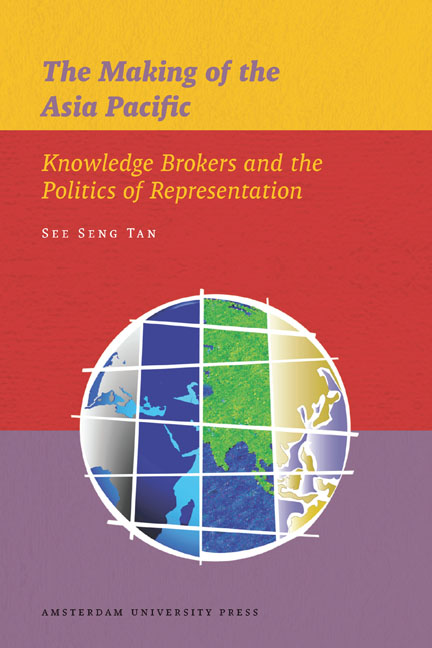Book contents
- Frontmatter
- Dedication
- Contents
- List of Tables
- Acknowledgements
- 1 Introduction: From ‘Pacific Asia’ to ‘Asia Pacific’
- 2 The Desire for Essence
- 3 Knowledge Networks as Agents of Representation
- 4 Representing the ‘Asia Pacific’
- 5 Representing Sovereign States
- 6 Representing the ‘In/Human’ Faces of Asia Pacific Security
- 7 Representing the ‘Authority’ of Knowledge Networks
- 8 Conclusion: A Plea in Three Parts
- Notes
- Bibliography
- Index
- Miscellaneous Ensmatter
3 - Knowledge Networks as Agents of Representation
Published online by Cambridge University Press: 10 December 2020
- Frontmatter
- Dedication
- Contents
- List of Tables
- Acknowledgements
- 1 Introduction: From ‘Pacific Asia’ to ‘Asia Pacific’
- 2 The Desire for Essence
- 3 Knowledge Networks as Agents of Representation
- 4 Representing the ‘Asia Pacific’
- 5 Representing Sovereign States
- 6 Representing the ‘In/Human’ Faces of Asia Pacific Security
- 7 Representing the ‘Authority’ of Knowledge Networks
- 8 Conclusion: A Plea in Three Parts
- Notes
- Bibliography
- Index
- Miscellaneous Ensmatter
Summary
The role of knowledge brokerages as producers and purveyors of knowledge on international life is no longer questioned today, least of all by conventional students of security (Adler 2005; Haas 1992). Likewise, the notion of security studies communities throughout the Asia Pacific region – comprising constituents of the various official as well as nonofficial national and regional security establishments – as epistemic agents is increasingly acknowledged by scholars for their contributions to knowledge constitution about security in ways positive and negative, depending on the respective appraiser's normative disposition (Ball 2000; Cheit 1992; Evans 1994a; Hernandez 1994; Jayasuriya 1994; Jones & Smith 2001a; Katsumata 2003b; Kim & Young 2005; Kraft 2000a, 2000b; Simon 1996a, 2002; Tan 2005c; Woods 1993, 1997). At the risk of oversimplification, two broad conceptual understandings arguably define how the region's security studies communities – notably, regional networks of research and policy institutes such as those of interest to this book – have generally been viewed in scholarly circles. The first understanding presumes an intentional subject that constructs security knowledge through instrumental actions. The second understanding presumes that construction operates in a deterministic fashion – a move which, as we shall see, seems to ignore or deny human agency (Carlsnaes 1992; Dessler 1989; Doty 1997; Wendt 1987). Thus understood, knowledge networks are either autonomous, voluntarist actors with settled identities who construct the identity of the region or of the state and influence its behaviour, or passive recipients whose subjectivity is but a product of pre-existing social structures or some ontologically prior constructor/author, and who exist principally to promote the interests and preserve the well-being of the state and the regime that rules it.
In contrast to both these essentialist interpretations, this present undertaking seeks to read Asia Pacific knowledge communities neither (in the first instance) as ‘autonomous origins of meaning, registers of social value, and irreducible agents of history-making’, nor (in the second) as passive, abject targets under the totalising control of the state, and void of meaningful agency (Ashley 1988: 245; Butler 1993: 3).
- Type
- Chapter
- Information
- The Making of the Asia PacificKnowledge Brokers and the Politics of Representation, pp. 45 - 68Publisher: Amsterdam University PressPrint publication year: 2013



